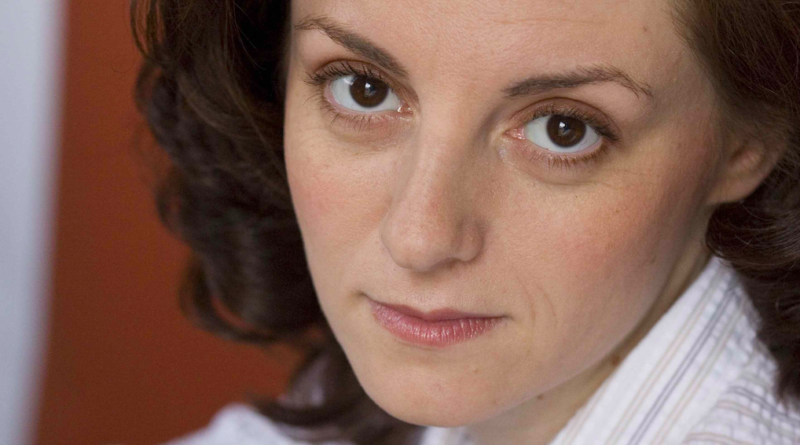INTERVIEW: Virtual production of ‘Megillah Cycle’ kicks off Purim week
Photo: Megillah Cycle, a new virtual production, stars Yelena Shmulenson. Photo courtesy of artist / Provided by press agent with permission.
The Congress for Jewish Culture has been bringing its virtual Yiddish theater series to audience members for the past couple months, offering viewers the chance to experience classic works with new interpretations. This month sees the premiere of Megillah Cycle, directed and adapted by Mike Burstyn, based on Itzik Manger’s modernist take on the traditional Purim play, according to press notes.
Manger’s work premiered in the 1930s as a cycle of poems that updated the biblical story of Queen Esther. The new surroundings were eastern Europe, and the new time period was the 20th century. Those poems were made into a musical production in the 1960s, and that show did so well it played Broadway in 1968. Burstyn starred in that musical production and is back with the source material for yet another take on Manger’s poetry.
Audience members can expect the play to be performed in Yiddish with subtitle translation. One of the stars of the virtual production is Yelena Shmulenson, who has appeared in TV’s Orange Is the New Black and the Coen brothers’ A Serious Man. She was born in Belarus and grew up in Ukraine. Recently Shmulenson exchanged emails with Hollywood Soapbox. Questions and answers have been slightly edited for style.
What is it like to perform in a virtual production?
It’s … complicated. On one hand, you get to perform with an incredible cast of fantastic actors from all around the world. But on a technical level, there are some obstacles: You have to pay attention to sound issues (your fridge hums or your heater whirrs, and your mic will pick it up and ruin a take). You can’t really move as much as you’d like because if you wave your hands too much or turn too sharply, half of you will disappear because of the virtual background limitations. Sometimes you don’t see your scene partner because of how the squares are arranged in Zoom (although you hear him, so it’s more like a radio play).
One of the advantages of a pre-recorded virtual production is that you can redo a scene if it didn’t go well the first time around (this part of the process is more like making a film; you can do multiple takes, and then the director and the editor will choose the best one). Being in a virtual production is a challenge that is a pleasure to overcome.
What do you like about this piece of theater? Did you have to learn a lot about its history?
I knew about the history of the piece before — this isn’t my first Yiddish rodeo. But it was very cool to be directed by Mike Burstyn (who was in the original production) and to hear him tell stories about it.
Could you describe your role in the production? How do you approach the character?
I play Esther the Queen who’s considered the heroine of the Purim story. She saves the Jewish people by telling her husband, King Ahashverosh, that Haman is planning to wipe out the Jews of the land. And although the King doesn’t say, ‘All right, my darling, I’ll take care of it,’ he allows the Jews to defend themselves — which is important because they do it, and they do it really well. And Esther sets Haman up so that at the end he pays for what he planned to do to the Jews. The play is in rhyming couplets, so there is a lightheartedness to it. I didn’t do a lot of preparation — once I put that crown on, it was pretty clear who Esther was. Plus, there is an additional layer of this Megillah being performed by the tailors’ guild of a small town, so my Esther is someone who is ‘playing’ at being a Queen.
What’s it like to speak the poetic words of Itzik Manger?
It’s tricky! It is very easy to get lulled by the beautiful rhymes, but you still have to tell a story: a story of your character and the story of the play. But the lines get into your head very quickly and then stay there for days.
Yiddish theater has so many important plays and productions throughout its long history. Why do you think Yiddish theater has remained so popular?
The language reflects the soul of the people. You can do Yiddish plays in English, but it’s not the same. That’s like playing old-time blues on a synthesizer — the notes might be there, but the feeling is gone. The shrugging, the humor, the history, the irony … they’re all there in the sound of Yiddish, and that’s what the audiences are responding to.
By John Soltes / Publisher / John@HollywoodSoapbox.com
Megillah Cycle, featuring Yelena Shmulenson, premieres Sunday, Feb. 21 at 2:30 p.m. EST on the Congress for Jewish Culture’s YouTube page. It will remain there indefinitely. Click here for more information.

